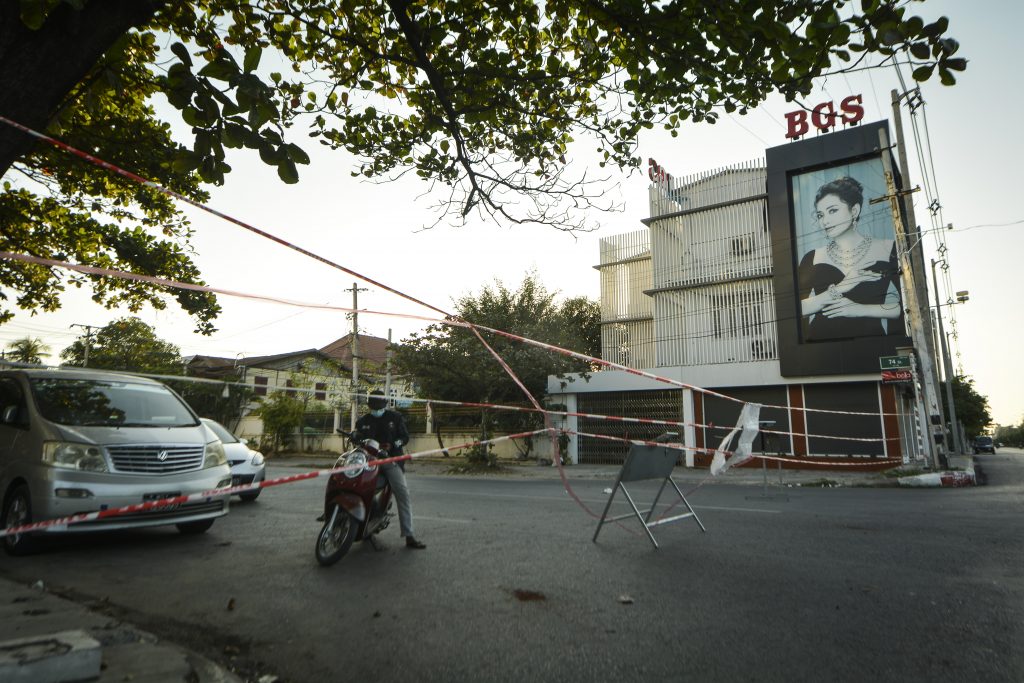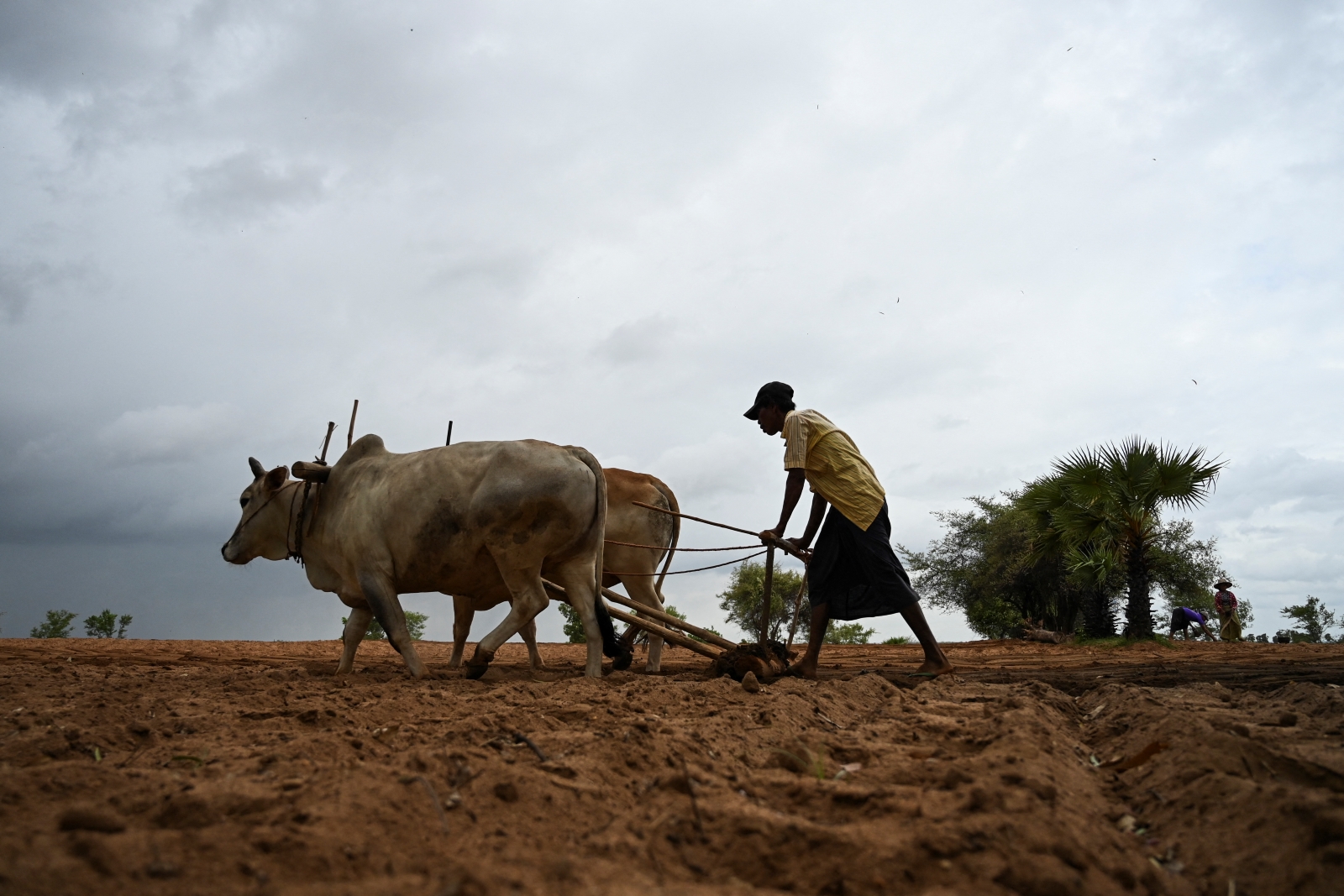Mandalay is struggling to balance virus containment with the economic impact of stay-at-home orders, which added another layer of hardship this month to the lives of casual day labourers already struggling to support their families.
By LIN TUN LA PYAE | FRONTIER
When the Mandalay Region government imposed strict stay-at-home orders on December 5 in the seven townships that make up the regional capital, daily wage labourer Ko Tun had already been out of work for a week.
Ko Tun, a migrant from a village close to the city, had worked as a day labourer doing masonry at building sites before construction in Mandalay was halted on September 26.
“I found work digging ditches and painting buildings [in the first week of October], but for much lower wages,” he told Frontier on December 6.
Three townships in urban Mandalay – Chan Aye Thar Zan, Maha Aung Myay, and Amarapura – were already under Ministry of Health and Sports-issued stay-at-home orders that were imposed early in Myanmar’s “second wave” of the coronavirus. But the new orders, which ran from December 5 to 18, were far stricter. Even Ko Tun’s low-wage ditch digging disappeared when they came into effect.
The orders required city residents not deemed essential workers to adhere to 17 rules, including unnecessary trips outside the home. Residents were allowed out to buy food or seek medical care, but only a few types of work were exempt. Special permits were also required to cross township borders, and those permits required household registration documents that Ko Tun, as a migrant worker living in informal housing, did not have.
“Since I’m not allowed to cross townships, I can’t even dig ditches,” he said.
Ko Tun was far from alone. COVID-19 Community Mobility Reports from Google highlight the dramatic effect of the stay-at-home orders: in late November activity at workplaces was down 39 percent compared to a January baseline, but after the stay-at-home orders were imposed activity declined further, to 60pc against the baseline. Activity in all of the other categories, which include “retail and recreation” and “supermarkets and pharmacies”, declined further against the baseline, except for “residential”.
Medical professionals and health workers in Mandalay welcomed the new restrictions as a necessary response to the city’s sharp rise in COVID-19 cases and deaths that began early in November, but for many – and particularly the poor – the rules have made life difficult.
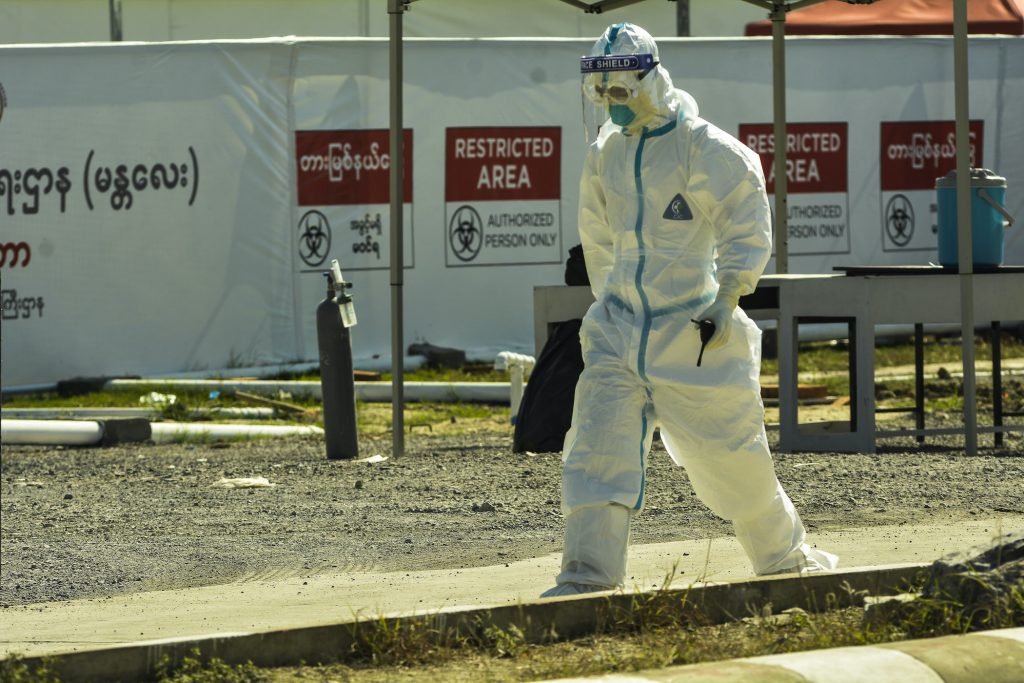
The government has arranged a series of handouts for needy families, including basic food distributed in April and three subsequent rounds of cash aid, but the program has not always gone smoothly.
Ko Tun, for instance, has not received a single kyat because he does not possess a valid household registration, which is required to receive the handouts.
“I don’t have a household registration and my employers aren’t helping with basic food or anything,” he said. “With no assistance, it’s getting harder and hard to feed all six of us in my family.”
But it’s not just low-paid workers who have suffered. The halt to construction work in Mandalay has also hurt people like Ko Ye Yint Tan, a construction company engineer. “During the former stay-at-home period [in April], I worked from home at half pay,” he said.
The strict stay-at-home orders expired on December 18 and people are crossing townships borders freely again. On the streets, nearly everyone wears a mask. But construction projects still need to pass government inspections for adhering to COVID-19 guidelines before work can resume, and Ye Yint Tan is not sure when his job site will be inspected. He lives in rented accommodation and worries that his salary will be halved again.
“I have to pay for rent, utilities and food; how will I make ends meet?” he said.
Hostile confrontations
Not everyone was required to stay indoors all the time. Workers in 11 sectors considered essential, including banks and food and pharmaceutical manufacturers and sellers, were exempted from the stay-at-home orders. Additionally, each household was given one permit a day issued by a township management committee that allowed them to travel between townships for food and emergencies, although unclear guidance from the government meant the regulations were generally poorly understood. Inspection teams comprising ward administrators, reserve fire fighters, social workers and local volunteers checked drivers’ and pedestrians’ travel permits and asked where people were going, but the lack of clarity around the rules led to sometimes hostile confrontations.
On top of the nationwide curfew between midnight and 4am, instructions from the regional government suggested the household permits to cross township borders were only valid until noon each day except in case of an emergency, but the wording was not clear and emergencies were left undefined, leaving people to interpret the rules on their own.
“It said the ticket wouldn’t be valid after noon, but you could go if you had a reason, so everyone had their own reasons to manipulate the officials,” Sai Han One, a doctor at a private hospital in Mandalay, told Frontier on December 18.
“It should be clearly stated if the shopping permit cards can only be used until noon; there have been a lot of arguments over this between pedestrians and inspection teams,” Ko Tun Win, chief editor of Shwe Mandalay News Journal, told Frontier on December 6.
How the rules were interpreted and enforced also varied from one township or checkpoint to another, with authorities issuing no guidance or clarification.
Local media reported that more than 5,400 people were each fined K5,000 for traveling without a permit within the first three days of the new restrictions being imposed.
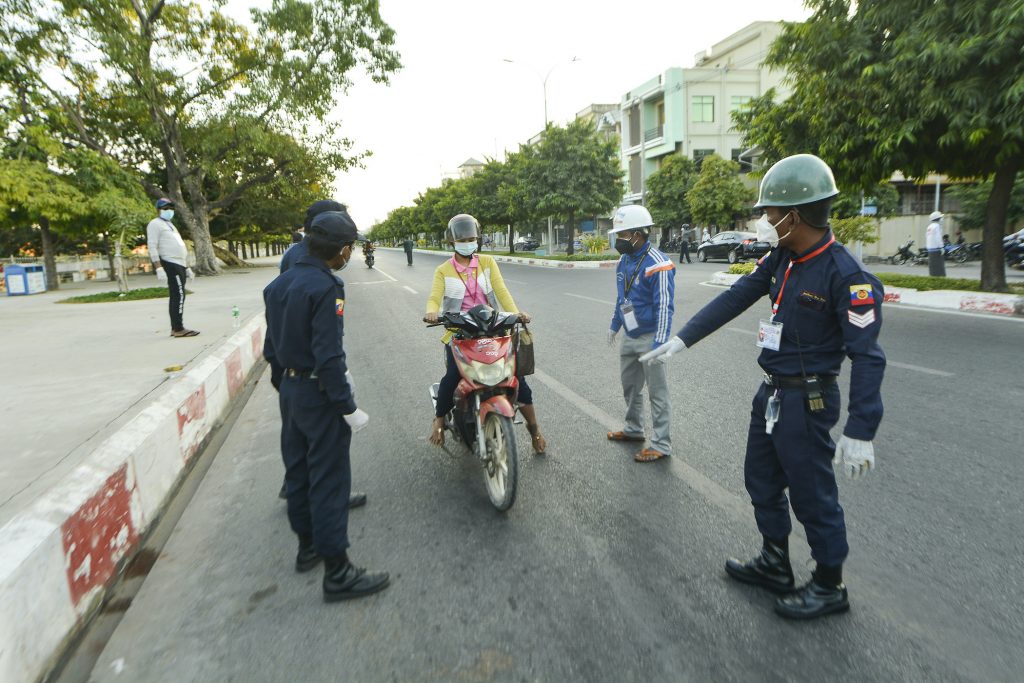
Soaring infection rates
Before November 8, Mandalay city was registering about 50 new COVID-19 cases a day – cause for concern, perhaps, but not for alarm. Election day though seems to have sparked a huge rise in cases that the government has struggled to bring under control. The act of voting brought residents together at crowded polling stations, while the National League for Democracy’s victory prompted large numbers of supporters to gather in defiance of crowd limits set by the Ministry of Health and Sports to celebrate, despite the NLD urging them not to. Ten days later, 223 people tested positive in the region and 176 in the city in a 24-hour-period. On December 16 the region hit a new daily record, with 364 new cases, of which the vast majority were in urban Mandalay.
Tun Win from the Shwe Mandalay News Journal said the authorities failed to take action against those defying the bans on gatherings around the election. He said he wonders whether the stay-at-home orders should have been imposed earlier, to reduce transmission before the virus really began taking off. Some are also perplexed why the regional government decided to let the new restrictions expire on December 18, despite the still-soaring numbers.
“It’s so bad here,” said Han One.
His private hospital specialises in renal care and does not accept confirmed or suspected COVID-19 patients, but a few in the hospital’s care have wound up testing positive anyway. Han One himself has had to quarantine twice after potentially coming into contact with the virus at work, though he tested negative both times.
“People don’t follow the rules. They aren’t afraid of COVID anymore,” he said, adding that he understands people are becoming fatigued by the orders and the lockdowns.
“We can’t blame them,” he added. “Let’s hope vaccines are coming next year.”
Post-election celebrations definitely helped the virus spread, said Ko Thet Kyi of the Mahar Social Rescue Team, a charity group involved in the pandemic response. COVID-19 symptoms usually emerge five or six days after infection, according to the World Health Organization; Thet Kyi said the number of people reporting symptoms to the Mahar team began to spike one week after the election. Groups like his have been busy transporting confirmed COVID-19 patients to hospitals and their close contacts to quarantine centres.
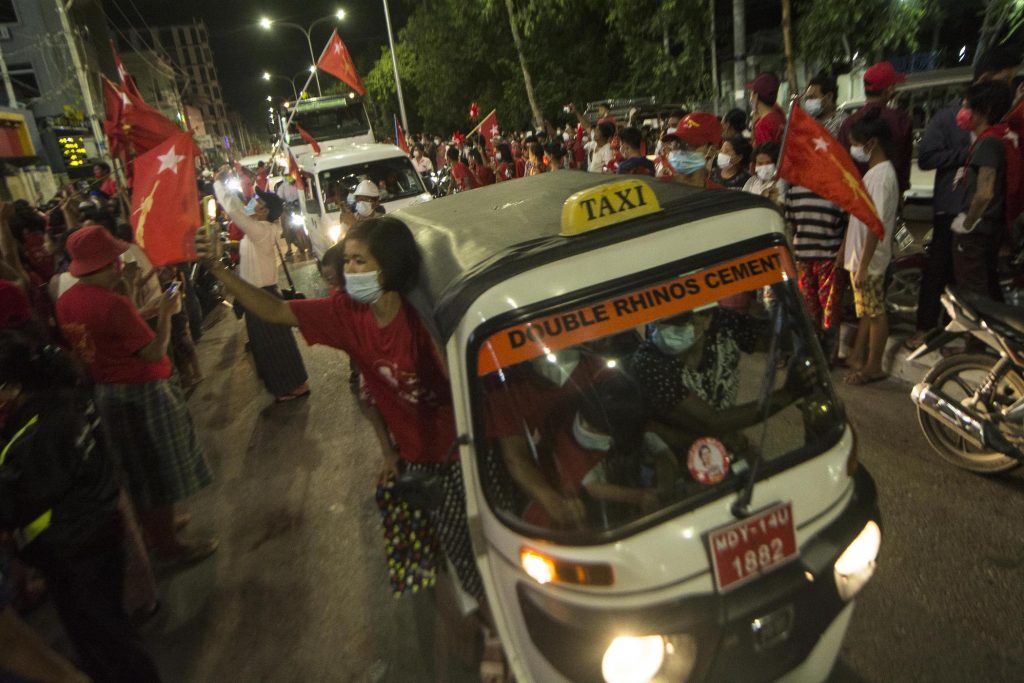
The Mandalay Region COVID-19 Prevention, Control and Treatment Committee said there are 10 hotel quarantine and 10 facility quarantine sites in the city. But some quarantine centres have exceeded their capacity, and those in close contact with infected persons are being required to home quarantine.
When a layperson living at the War Khin Kone monastery in downtown Chan Aye Thar Zan Township began showing symptoms of COVID-19, four monks and 15 other laypeople had to quarantine at the monastery rather than a facility. Ko Than Htike, one of the laypeople, said the government provided them with no food or medical support.
“We have finished our 14 days of self-isolation at the monastery, but no one from the health department ever contacted us,” he told Frontier.
Than Htike said the infected person was admitted to the hospital, where he stayed for 10 days, but he received no medication there and had to rely on donated food.
State Counsellor Daw Aung San Suu Kyi said in a December 3 statement that it costs the government between K1.5 million and K2 million to care for an infected person with mild symptoms, and up to K5 million if their situation becomes critical. Each person quarantined costs K600,000, she added.
Between 150 and 200 people are being hospitalised with COVID-19 a day in Mandalay, according to U Khin Maung Tint of charity group Philanthropist Min Gaung Rescue Team. He said he’s heard doctors and nurses are also increasingly developing symptoms.
Dr Su Su Dwe, medical superintendent of Mandalay General Hospital, told Frontier on December 8 that 102 of the hospital’s employees had been infected with COVID-19. Some were still being treated and some had returned to work, she said.
“Because the number of confirmed cases is rising [so fast], we haven’t been able to prepare separate toilets or dining rooms for doctors and nurses. When they eat lunch, they may risk contracting the disease, since their masks will be off,” she said.
‘A long war’
Lack of state resources mean much of the COVID-19 response is outsourced to volunteers and charity groups. But the charity groups offering transport to hospitals and quarantine centres say they are running out of money for fuel and supplies. Ko Wei Phyo Han said his Yin Bat To Nyi Naung Rescue Team is struggling to buy fuel to keep its vehicles running. Khin Maung Tint said the Philanthropist Min Gaung Rescue Team is going through about 100 PPE suits a day, and urged the business community to donate food to quarantine centres, and fuel and PPE suits to hospitals and charities.
But businesses are also struggling. Suu Yit Nwe, a Mandalay book publisher, said the stay-at-home orders between December 5 and 18 even hurt book sales, because customers couldn’t get to shops.
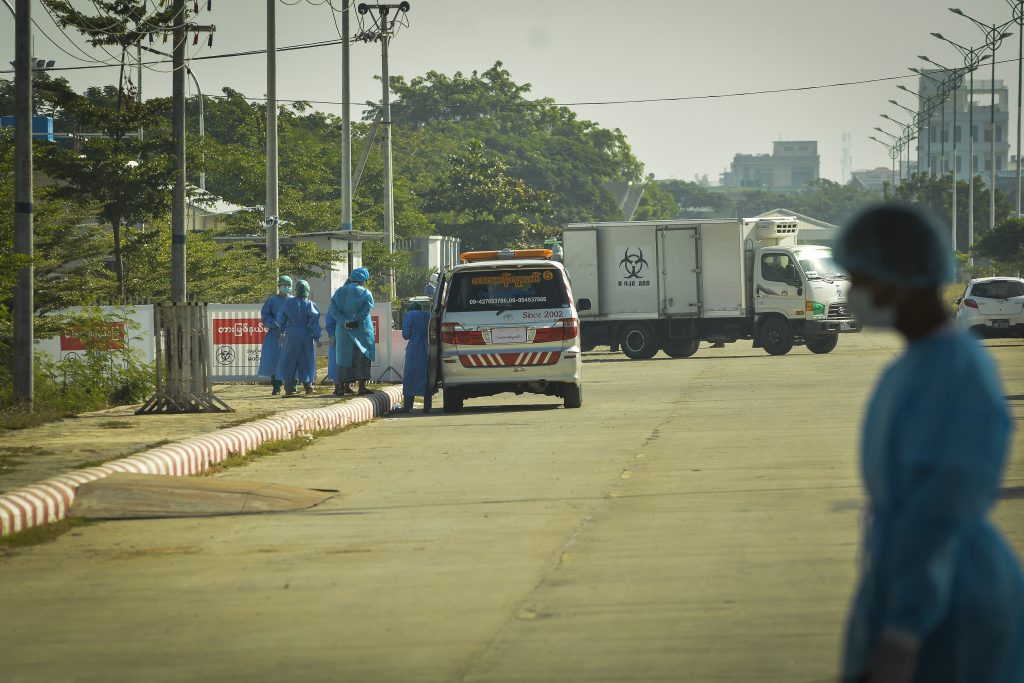
“Sometime we send books to customers through the mail, but mostly we are idle,” he told Frontier shortly after the orders came into effect. “No one is coming to our shop because cross-township travel is restricted.”
It’s was a similar story for Ko Aung Moe Tun, the owner of an ice factory in Chan Aye Thar Zan Township. He had to stop delivering to other townships.
Both companies are unlicensed, which made them ineligible for travel permits.
It is common for small businesses with fewer than five employees in both Mandalay and Yangon to operate without a government licence.
“I think the government should reconsider its refusal to issue travel permits to unlicensed businesses,” Aung Moe Tun said before the lifting of the stay-at-home orders. “Why should these businesses have to stop operating?”
“The government should be helping the SME sector,” said Suu Yit New.
He said the travel restrictions made it impossible for some people to get to markets for daily food necessities.
But stringent policy and strict enforcement does have its supporters. Khin Maung Tint said he believes the pandemic can be overcome if people stay home.
“We have to fight a long war. If we are prepared to endure inconvenience for just a little bit longer, we will be okay,” he said.
Thet Kyi from Mahar Social Rescue Team also expressed support for the stay-at-home policy, but said the government should have done more to ease the financial pressure it put on workers living hand to mouth.
Ko Tun, the jobless day labourer, said he hopes that he’ll be eligible for the next round of government financial relief.
“I want to ask the government to support people like us,” he said, “who are currently ineligible because we do not have household registration documents.”


